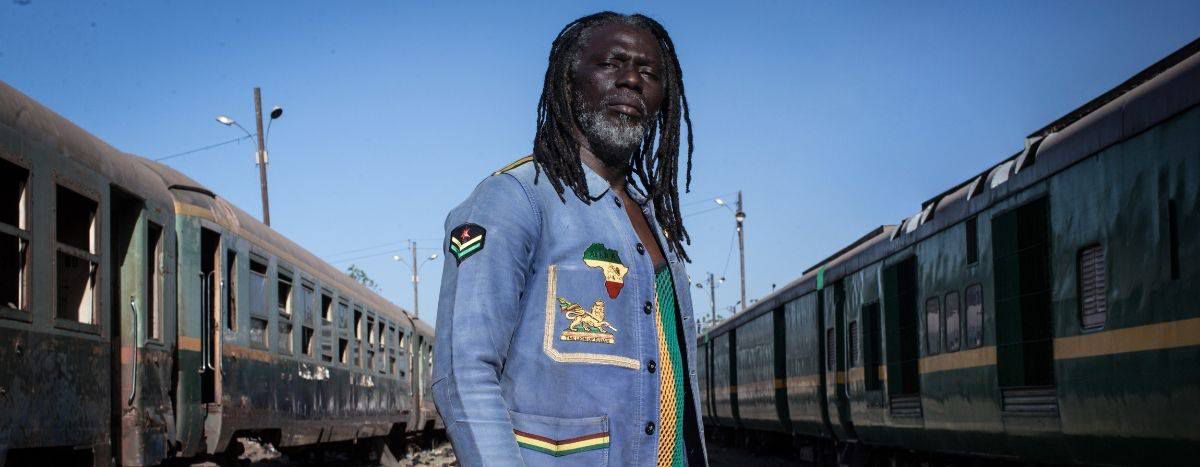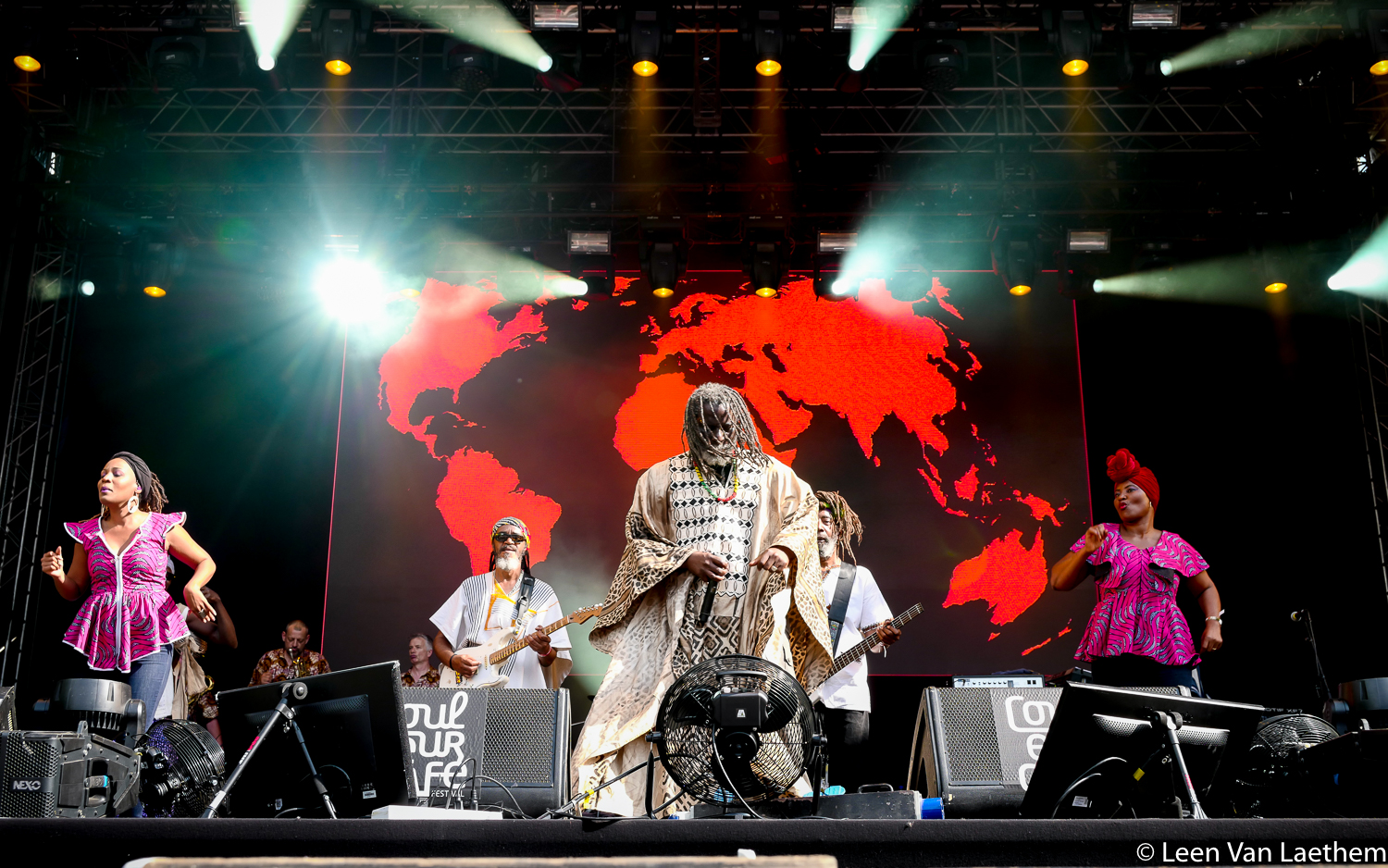
Tiken Jah Fakoly: "Africa pollutes less, yet it's still a victim"
Published on
Translation by:
 Tasmin Chu
Tasmin Chu
With a career spanning 25 years, 4 gold albums and his 11th album Le monde est chaud (The world is hot) just released, the reggae artist Tiken Jah Fakoley heats up his Ivory Coast vibes at the scene of the Couleur Café festival. In an interview for Cafebabel, the artist reflects about his commitment to the climate.
You have chosen to return to Abidjan for your new album after 20 years without recording. What does this return mean to you?
Back in Abidjan , it really feels like returning to the source, to find the sounds that I made at the beginning of my career. In 2007, I decided to work in English to really spread my music, so that someone who does not listen to reggae can gain access to the messages of my music. But then I had some criticism from the fans who said, "It seems like the sound has changed, you're moving away from the beginning." I still took this criticism into account, and I wanted to return to Abidjan to record after 20 years, with Ivorian musicians, in an Ivorian studio to find this typical African sound. What is special about our reggae is the traditional instruments. We can not do better reggae than Jamaicans, but we can prove that Jamaicans came from Africa.
In your new album The world is hot, you sing a lot in the language of the Ivory Coast, Dioula. What changes for you when you sing in French versus when you sing in Dioula?
When I make a song in French, it's because the inspiration comes in French. When it really is about international politics, it's important that it's in French or in English. But when it's about societal issues that African people need to be aware of, there's almost no point in singing it in French. For example, my track "Ayebada" is about forced marriages. In Africa, that still happens a lot, not like in in Europe. So I think with a subject like that, inevitably it has to be sung in Dioula, so that the people who practice forced marriages can hear it.
In your work, what's your strongest demand today?
Today, it's the environment. Because the world is hot. Leaders are struggling to make and enforce the decisions necessary for the world to get less hot. I think that everyone needs to mobilize if we want to leave a clean planet to our children. If we want to live in a better world. It's why I dedicated two titles on the album to the environment.
When we talk about climate justice, are we also talking about social justice?
I think inevitably it's talking about justice, even with respect to Africa. The country pollutes less, and yet it's still a victim. If there's an injustice, there has to be a mobilization.
And the youth? The European demonstrations for the climate?
The youth are the new ruling class of tomorrow. The mobilizing students, high schoolers, all that gives me hope because if the youth can mobilize then that says that they will behave better than us, and then then the planet will get better. It's the youth who have reason. They must continue to resist, to demonstrate, to move the lines. I think that it's through these demonstrations that policies will change.
And can music change things?
Yes, because music awakens the conscience. Awakens, not wakes up. There are things which we cannot accept, and music contributes to that awakening of the rebellious consciousness. Reggae, it's the music of the people. It's music that touches upon subjects that other types of music don't necessarily address. It's sacred music.

In your last album, you sang with Soprano and you co-wrote a song with Gaël Faye. The succession is ensured?
The theme of the environment is so important that I wanted to find an artist who can go where I can't go. There are people who hear Soprano but don't hear me. And Gaël Faye is part of the new script. I wanted to work with those who can carry the fight a little bit further.
Is the project Free Radio Fakoly part of this process to make young people more aware of their responsibilities?
I did it to make my contribution to the development of culture in the Ivory Coast. And I also opened a library so that people can come and inform themselves about reggae culture and Pan-Africanism.
In your work, the idea of Pan-Africanism is very present. Why?
For me, it's fundamental, because no African country can free itself alone. The United States is powerful, it's several states together. The European Union also understood it. Africans need to realize that it's only the United States of Africa that can prevail in this world, which can be compared today to a jungle. For Africa to be able to defend itself in that jungle, she has to be powerful. And for her to be powerful, she has to speak with a single voice. That is what will allow us to get out of underdevelopment, because we are not respected. When we bomb Libya, we don't ask the opinion of Africa. We ask the UN Security Council.
What do you think of the European position on the matter of immigration? Is it not more "closed" than "open" borders?
I think we will have to find the solution so that the youth can stay in Africa. And for that, European leaders need to support good governance, the fight against corruption. The solution is not to build walls or to put dams. I sang "Open borders" to denounce injustice. Europeans come when they want Africa to do what they want, take what they want and stay if they want. But Africans can not do that in Europe.
I tell people, if our ancestors were all gone, maybe we would still be enslaved. If our parents had all blocked, perhaps Africa would still be colonized. But they stayed, they fought. And they abolished slavery and colonization. We must do everything to stay and abolish corruption, to make Africa a dream continent, because nature has given us everything.
« If there is an injustice, it takes a mobilization »
There is a lot of talk right now about Laurent Gbagbo's return for the next Ivorian presidential elections next year. What is your opinion about this?
I think he should withdraw to avoid new tensions. His opponents should also withdraw, the president Alassane Ouattara and the former president Henri Konan Bédié ( Gbagbo , Ouattara and Bédié wish to be candidates for the presidential elections, editor's note). I proposed to the Ivorians to demonstrate, to ask these three leaders not to introduce themselves. Obviously, I was attacked by supporters of these leaders who believe that they still have room.
In this album, you sing "Some say that Fakoly was, they're right" ... Are they right?
This song is called "Ngomi", it's a cake from my home and both sides are grilled. Those who are in power today and who were before the opposition, when I was singing, they cheered on me. Now that they are in power, they do not like my message anymore, so I'm grilled on both sides!
They thought I was an activist of their party, but I denounce when it's not right. Since then, I do fewer concerts, even in Ivory Coast, because the sponsors are afraid of the leaders. So I'm talking about myself in this song.
Is there a difference between the Fakoly of 25 years ago and today??
Yes, wisdom. In my texts. And then on stage, I jump less. But I would really say wisdom. Even if I do not know the weight of the mission, I know where I am going. I am going on the path of African awareness and spreading information to the rest of the world about what is really happening in Africa. There is a big job to do, because people do not really know Africa. We,know the History of Belgium , the History of France . Many think that Africa begins with slavery whereas before colonization there was a whole civilization in place. So there is a big job to inform people. That's why I know my mission is noble.
Photo credits : © Jessy Nottola
Interview by: Francesca Festa et Amélie Tagu
Translated from Tiken Jah Fakoly : « L’Afrique pollue moins, et pourtant elle est victime »


